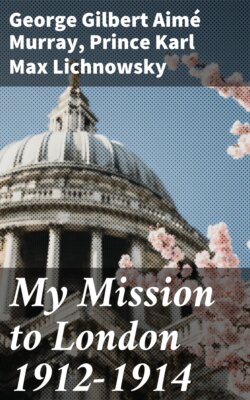My Mission to London 1912-1914

Реклама. ООО «ЛитРес», ИНН: 7719571260.
Оглавление
George Gilbert Aimé Murray. My Mission to London 1912-1914
My Mission to London 1912-1914
Table of Contents
PREFACE
MY MISSION TO LONDON. 1912-14
My Appointment
Morocco Policy
Sir Edward Grey's Programme
The Albanian Question
The Near East and the Policy of the Triple Alliance
The Conference of Ambassadors
The Balkan Conference
The Second Balkan War
Liman Von Sanders
The Colonial Treaty
The Bagdad Treaty
The Question of the Navy
Commercial Jealousy
The Court and Society
Sir Edward Grey
Mr. Asquith
Nicolson
Tyrrell
Attitude of the German Foreign Office
In Case of War
The Serbian Crisis
The English Declaration of War
Retrospect
My Return
The Question of Responsibility
The Enemy Point of View
Bismarck
Our Future
Footnote
—————————————————————————————————— Important Books of the Day ——————————————————————————————————
—————————————————————————————————— GEORGE H. DORAN COMPANY Publishers New York PUBLISHERS IN AMERICA FOR HODDER & STOUGHTON ——————————————————————————————————
Отрывок из книги
George Gilbert Aimé Murray, Prince Karl Max Lichnowsky
Published by Good Press, 2021
.....
Lichnowsky was a friend of England, but he was no pacifist or "little German." His policy was to favour the peaceful expansion of Germany, in good understanding with England and France, on the seas and in the colonies. He aimed at "imperial development" on British lines; he abhorred the "Triple Alliance policy" of espousing Austria's quarrels, backing Turkey against the Balkan States, intriguing against Russia, and seeing all politics in the terms of European rivalries with a background of war. His own policy was one which, if followed loyally by the German Government, would have avoided the war and saved Europe.
There are one or two traits in Lichnowsky's language which show that, with all his liberality of thought, he is still a German. He accepts at once, on the report of a German secret agent, the false statement that Grey had concluded a secret treaty with France. He mentions, as if it were a natural thing, the strange opinion that the Standard was "apparently bought by Austria." He describes Mr. Asquith as a pacifist and Sir Edward Grey as both a pacifist and, ideally and practically, a Socialist. One must remember the sort of views he was accustomed to at Potsdam.
.....